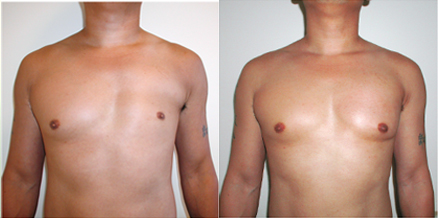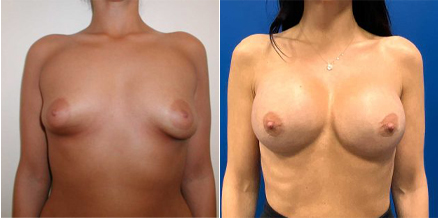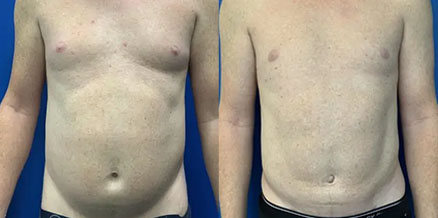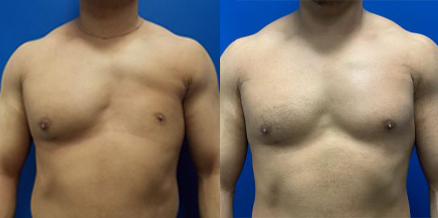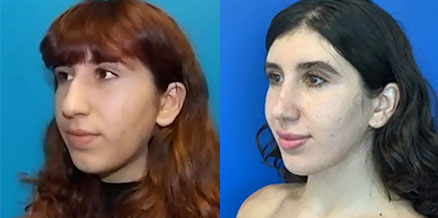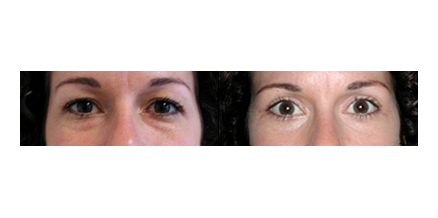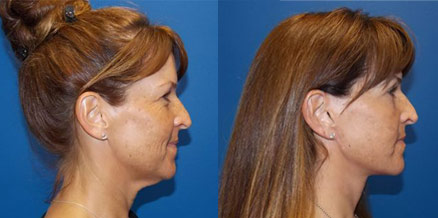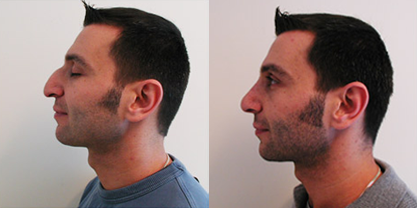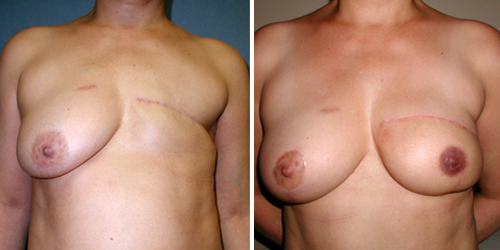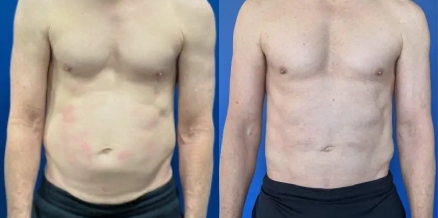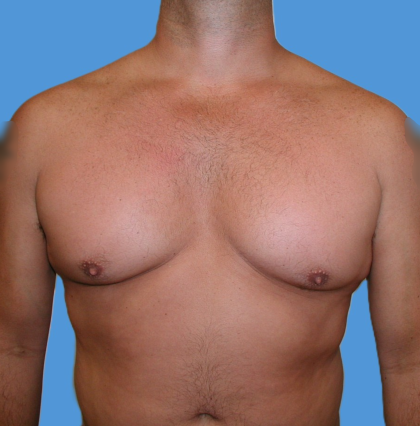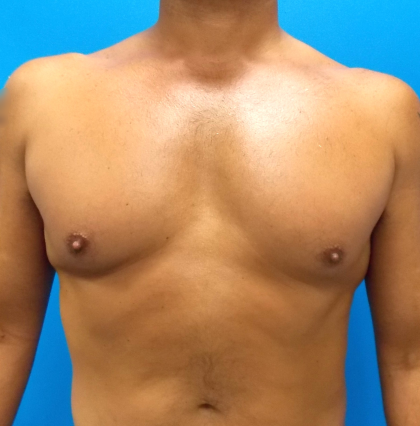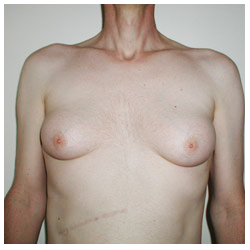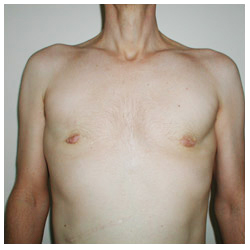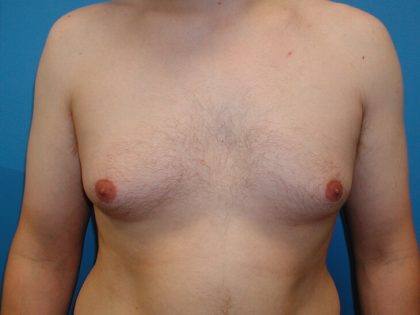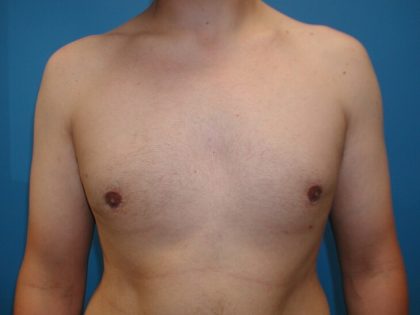Gynecomastia
Conveniently located to serve the areas of Beverly Hills, West Hollywood and Los Angeles
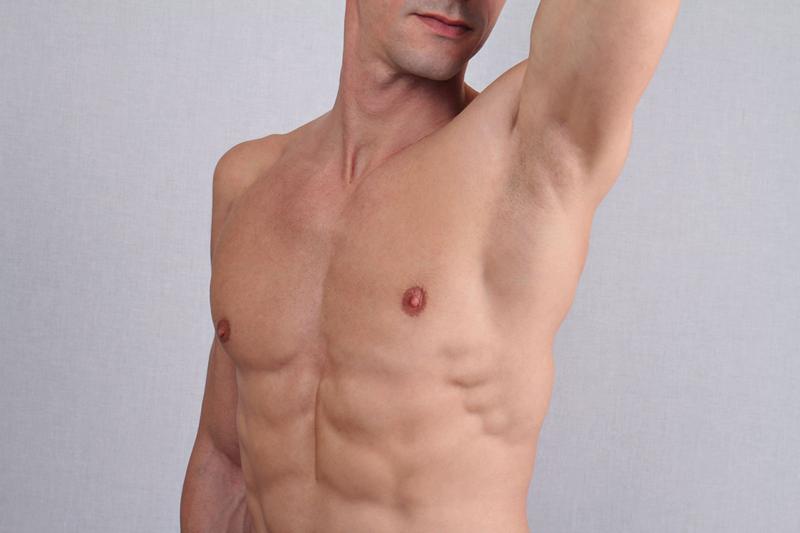
Gynecomastia is the development of abnormally large breast tissue in males. Approximately a third of male children will develop gynecomastia during puberty that will resolve spontaneously as the pubertal hormone surges stabilize. In 10% of men, however, the condition may persist into adulthood. Some men seek surgical correction for enlarged breasts because it is the most definitive way of addressing the problem of gynecomastia, (1) which may be the result of hormonal changes, genetics, disease, or the use of certain medications and supplements.
Contents
- 1 Before and After Photos
- 2 About Gynecomastia
- 3 Benefits of Gynecomastia Treatment
- 4 Gynecomastia Treatment Candidates & Consultation
- 5 Preparation
- 6 Procedure
- 7 Recovery
- 8 Results
- 9 Cost of Gynecomastia Treatment in Beverly Hills
- 10 FAQ
- 10.1 What is the recovery time after gynecomastia surgery?
- 10.2 Will I have noticeable scars after gynecomastia treatment?
- 10.3 Will I lose nipple sensation after gynecomastia surgery?
- 10.4 How long do I need to wear the chest garment after gynecomastia surgery?
- 10.5 Can I have other procedures done together with gynecomastia surgery, such as a tummy tuck?
- 10.6 Can medications that suppress estrogen or estradiol be used to reverse gynecomastia?
- 10.7 Can gynecomastia recur after gynecomastia surgery?
Before and After Photos
Dr. Mossi Salibian is a board-certified plastic surgeon and has transformed thousands of lives with his body contouring procedures, helping both men and women achieve their body goals and improve their confidence. Contact our office near Beverly Hills or call (310) 550-0750 to schedule a consultation and learn more about how we can restore your masculine contour for your desired look.
About Gynecomastia
Enlarged male breasts from gynecomastia affect approximately 32-65% of men during their lifetime, and the condition can cause anxiety. (2) Gynecomastia is often related to an increase in estrogen levels in men as they age, reproductive issues (hypogonadism), genetic disorders, the use of prescription and over-the-counter medications, use of anabolic steroids, and the chronic use of recreational drugs such as marijuana which cause gynecomastia. As testosterone levels dip with age and estrogen increases, hormonal imbalances can also result in enlarged breasts. (3) In addition various cancers, such as breast cancer in men, which is 1% of all breast cancers, can present with gynecomastia. The condition not only changes the way your clothes fit and your daily routine but also affects how you function socially and psychologically. (4)
Benefits of Gynecomastia Treatment
The benefits of gynecomastia treatment include the following:
- Enhanced self-esteem
- Improved body contour
- Masculine-appearing chest
- Long-lasting results
- Fast recovery time
- Minimal downtime
Gynecomastia Treatment Candidates & Consultation
The best candidates for gynecomastia treatment are nonsmokers with a healthy lifestyle who are interested in masculinizing their chests. During your consultation, Dr. Salibian will ask about your lifestyle, medical history, and expectations to develop a treatment plan that helps you meet your goals. We can also discuss how to address sagging skin (ptosis), with a nipple and chest skin lift and tightening, an issue that can affect men with gynecomastia if their skin has become stretched. (5)
Preparation
To prepare for a gynecomastia reduction surgery, you will first see your primary care doctor for medical clearance. You will need to stop taking blood thinners 1-2 weeks before your procedure and other dietary and health supplements that may increase the chance of bleeding. If you are a smoker or vaper, you will need to quit 6 weeks before and after for the best results. The preoperative guidelines will outline all the necessary steps to follow for a seamless experience. Having proper support and adequate rest will enhance your recovery.
Procedure
Gynecomastia surgery is a highly individualized procedure tailored to each patient’s unique needs and degree of gynecomastia. Dr. Salibian performs the surgery usually under anesthesia to ensure your comfort throughout the procedure. The available techniques include:
- Liposuction for Gynecomastia: For patients with primarily pseudogynecomastia (excess fibrofatty tissue), seen in men who have gynecomastia and are overweight; liposuction can be effective in contouring the chest. Incisions are small and strategically placed to minimize visibility. Through these incisions, Dr. Salibian will use a specialized, thin cannula (hollow tube) to suction out the unwanted fibrous (thick) gynecomastia tissue and flatten and contour the area to achieve a masculine-appearing chest.
- Male Breast Reduction Surgery: Where there is an excess of glandular breast tissue, surgical excision is necessary. Dr. Salibian will create discreet incisions, often around the areola, to remove the glandular tissue and sculpt a masculine chest contour. In some cases, a combination of liposuction and surgical excision may be used for optimal results.
In some cases, a considerable amount of skin excision and nipple repositioning may be required. The procedure usually takes between 2-3 hours to complete.
Recovery
After gynecomastia surgery, you can expect a recovery period of about a week to ten days that involves some downtime for proper healing. Here are some general guidelines to follow:
- Arrange for someone to drive you home and assist you during the initial days of recovery.
- Wear a compression garment as instructed by Dr. Salibian to reduce swelling and pain and support the chest area.
- Take prescribed pain medication and antibiotics to manage discomfort and prevent infection.
- Avoid strenuous activities, heavy lifting, or intense exercise for several weeks following the surgery.
- Attend follow-up appointments with Dr. Salibian to monitor your healing progress and address any concerns or questions.
- Some patients who require extensive chest wall contouring with nipple areolar repositioning will also require drains that the staff will teach you how to manage.
Swelling, bruising, and mild discomfort are common during the initial stages of recovery but will gradually subside. It is important to follow Dr. Salibian’s post-operative instructions carefully to ensure a smooth recovery and achieve optimal results.
Results

Gynecomastia reduction surgery effectively removes the excess breast tissue that occurs in men resulting in a masculine contoured chest and upper body. The successful execution of gynecomastia surgery allows men who suffer from this condition to be self-confident, lead an active life, and not have to think about covering up the chest area at the beach or be embarrassed by its appearance in public. The results are long-lasting and easy to maintain if you remain at a consistent weight and follow a healthy diet and exercise routine. You can enjoy your new chest appearance for years without having to worry about how your chest looks or how clothes fit.
Cost of Gynecomastia Treatment in Beverly Hills
The cost of your gynecomastia surgery will depend on your individual treatment plan. The price for the procedure with operating room and anesthesia costs may range anywhere from $9000 to $18,000. There is no need to live with enlarged male breasts, especially if you are uncomfortable with the way your body looks. Contour your chest for greater confidence! Contact our Los Angeles office or call (310) 550-0750 to learn more about how we can restore your figure.
FAQ
What is the recovery time after gynecomastia surgery?
Recovery times vary for each individual, but patients typically return to normal activities within two weeks following gynecomastia surgery. Patients should avoid strenuous exercises and heavy lifting for four to six weeks to ensure proper healing.
Will I have noticeable scars after gynecomastia treatment?
Incisions are placed in inconspicuous locations and carefully closed to minimize visible scarring.
Will I lose nipple sensation after gynecomastia surgery?
Although there is a chance to lose sensation, most people do not lose their sensation or if it does, it is temporary and will return in several weeks.
How long do I need to wear the chest garment after gynecomastia surgery?
Usually, patients need to wear the garment for up to two weeks after surgery.
Can I have other procedures done together with gynecomastia surgery, such as a tummy tuck?
Yes, that is sometimes performed as a combined procedure. Whether to have gynecomastia surgery done at the same time as other procedures, or staged with other surgeries depends on the degree of gynecomastia and the extent of the abdominal procedure needed among other things.
Can medications that suppress estrogen or estradiol be used to reverse gynecomastia?
Sometimes patients are referred who have already been placed on anti-estrogen medications to help reverse the gynecomastia. It is often ineffective and temporary with the added side effects of being on long-term estrogen suppression medications where surgery will immediately and definitively resolve the condition.
Can gynecomastia recur after gynecomastia surgery?
It can recur if the patient’s hormonal makeup were to change with age, the surgery was not performed adequately and/or the patient is taking medications or supplements that may stimulate regrowth of the gynecomastia tissue.
References
- Tukenmez M, Emiroglu S, Kozanoglu E, et al. Single axillary incision endoscopic surgery and liposuction for gynecomastia. Medicine. 2023;102(7):e33020. doi:https://doi.org/10.1097/MD.0000000000033020
- Polat S, Cuhaci N, Evranos B, Ersoy R, Cakir B. Gynecomastia: Clinical evaluation and management. Indian Journal of Endocrinology and Metabolism. 2014;18(2):150. doi:https://doi.org/10.4103/2230-8210.129104
- Johnson RE, Murad MH. Gynecomastia: Pathophysiology, Evaluation, and Management. Mayo Clinic Proceedings. 2009;84(11):1010-1015. https://www.ncbi.nlm.nih.gov/pmc/articles/PMC2770912/
- Holzmer SW, Lewis PG, Landau MJ, Hill ME. Surgical Management of Gynecomastia. Plastic and Reconstructive Surgery – Global Open. 2020;8(10):e3161. doi:https://doi.org/10.1097/gox.0000000000003161
- Chang D, Siy R, Friedman J, Brown R. Trends in the Surgical Correction of Gynecomastia. Seminars in Plastic Surgery. 2015;29(02):122-130. doi:https://doi.org/10.1055/s-0035-1549053

